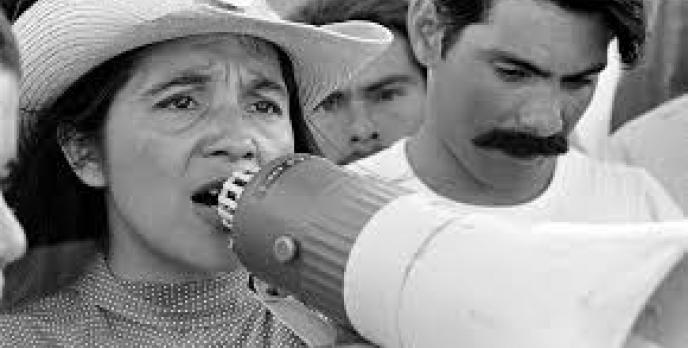Labor Activist Dolores Huerta on Cultural Competency in the Workplace

Cultural competency is a key factor for the success of any organization, though it is often overlooked. Although each person may have different roles, every person is necessary for the system to function properly. Through cultural competency, each player in the organization gets their own needs met, while also understanding the needs of other parties. This holds true for every company, business, organization and working system, including the agricultural sector. During the closing celebration of Latinx Heritage Month on October 13, USC Annenberg held a Zoom discussion between USC President Carolt Folt and labor activist Dolores Huerta. During the discussion, Huerta reminded attendees about the importance of cultural competency when fighting for labor rights of farm workers in the 1960’s. She reminded everyone that even though we may all come from different backgrounds or take on different roles in society, “We are one human race.”
Dolores Huerta is best known for her community service activism in co-founding the United Farm Workers, formerly known as the National Farmworkers Association, with late labor activist Cesar Chavez. She is also founder of the Dolores Huerta Foundation. At an early age, Huerta started lobbying, organizing farmworkers and negotiating contracts for laborers. Throughout her life, Huerta’s organizing skills originated from her strength in contextualizing her passions into soft skills and rejecting the status quo, while believing in the power of individual and collective action.
Huerta’s experiences with community activism and trying to solve the issue of securing labor rights required the very soft skills the USC Annenberg Executive Education Program emphasizes. She used empathy to listen to the workers’ needs in order to negotiate fair contracts with management.
“We, individually and collectively, have the power to change things,” Huerta told President Folt, when discussing fighting for the benefits of farmworkers. Huerta explained that the farmworkers were desperate to get toilets and drinking water in the workplace, but did not know exactly how they were going to get them. “We have to teach people and make them understand that they have power and not to give up.” Cultural competency is what allowed her to step into the boundary of the farm workers and cross organizational borders when discussing with the farm leaders about the basic needs of the laborers.
In addition to negotiating fair contracts, Huerta also helped to organize a labor strike with the Filipino and Latino grape farmworkers in the 1970s, which then evolved into the national grape boycott. Through Huerta’s work and the work of other labor organizers, the California Agricultural Relations Act was passed in 1975, providing safety for agricultural workers when bargaining fairer working conditions. Because of this Act, agricultural workers and allies are able to continue the fight towards justice, such as providing fair pay for undocumented laborers.
Dolores Huerta closed Latino Heritage Month with a reminder that every voice counts, and when the appropriate skills to empower others are applied, a workplace system is able to function properly. Huerta and other labor activists fight for a culturally competent society in which the needs of all laborers and parts of the system are met with empathy and respect.
Especially with the COVID-19 pandemic, the need for cultural competency is at an all time high as many people across the nation and globe face challenges that require human expertise. During the onset of the virus, many obstacles arose and manifested in different ways. People’s ways of life drastically shifted and organizations were forced to restructure their business models. Though many businesses and organizations have gone through an adjustment period with physical distancing, the work environments that thrive are those in which all people communicate with one another in order to understand their needs to be successful. Through cultural competence and effective communication, leaders, employees and all stakeholders can work together to reach a common goal.
Huerta ended the webinar reminding the attendees that grand issues are solvable through humanistic resolutions. Huerta affirmed, “The pandemic has shown us that we have to take care of each other.”
More information about the Dolores Huerta Foundation and Huerta’s current projects can be found at https://doloreshuerta.org/.
To learn more about the United Farm Workers and their current work towards labor justice, visit https://ufw.org/.
If you would like to learn more about building a culturally competent and empathetic team or organization, contact Annenberg Executive Education.

